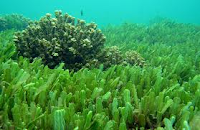 |
| Nutritious Gift |
First, though, let’s talk about sea vegetables and
algae in general. “Yeeewwww!” you might say. I
suppose I did, too, several years ago
when I was first delving into raw food eating.
But wait! There is richness to be
had in these somewhat salty greens from the ocean. Read on.
Seaweeds grow in the mineral –rich brine of the ocean and transform its fifty-six known minerals, including calcium, iodine, iron, potassium, and magnesium, into nutrients that we can assimilate. In fact, seaweeds contain ten to twenty times more minerals than land-grown plants do. Their abundant mineral content makes sea vegetables an important element of the raw foods diet.
 |
| Rich in Minerals |
Seaweeds grow in the mineral –rich brine of the ocean and transform its fifty-six known minerals, including calcium, iodine, iron, potassium, and magnesium, into nutrients that we can assimilate. In fact, seaweeds contain ten to twenty times more minerals than land-grown plants do. Their abundant mineral content makes sea vegetables an important element of the raw foods diet.
Seaweeds offer many benefits to human health. They increase metabolism, purify the blood,
help break down fat, improve joint flexibility, and help heal mucous
membranes. They are naturally
alkalinizing, antibacterial, antifungal, and antiviral. They also strengthen kidneys and beautify the
skin and hair. Additionally, and very importantly, they contain alginic acid, a
compound that binds in the body with heavy metals, environmental toxins, and
other chemicals, and then carries them from the body and out.
 |
| Kelp Granules for salads, smoothies, etc. |
With that glowing introduction, let us turn to Kelp, and the special advantages it
offers in weight loss endeavors.
Kelp is an excellent supplier of calcium. You can expect stronger bones, nails and
teeth along with weight loss.
Kelp is also known to improve your circulatory system and
provide blood purification.
 |
| Kelp all dressed up |
If you are not used to regularly consuming sea vegetables, start off with 600
mg for each meal, and gradually
increase the dose to 1200 mg per meal.
Crush the kelp to fine powder. It
is salty in taste, and can be sprinkled on salad or soup—anything that is not sweet.
It is available in capsule form, which is not nearly as
much enjoyed as the real food.
Try this simple recipe to get you started on a healthy
sea vegetable adventure. Your body will
be grateful for your effort!
Kelp Cucumber Salad
Soak kelp in water for 15 minutes and slice it down to
thin pieces. In a bowl of whisked maple
syrup or agave nectar, tamari, and vinegar, add kelp and thinly sliced peeled
cucumber.
 Enjoy!
Enjoy!
Stay tuned for more good news about Kelp and other Sea
Vegetables.






